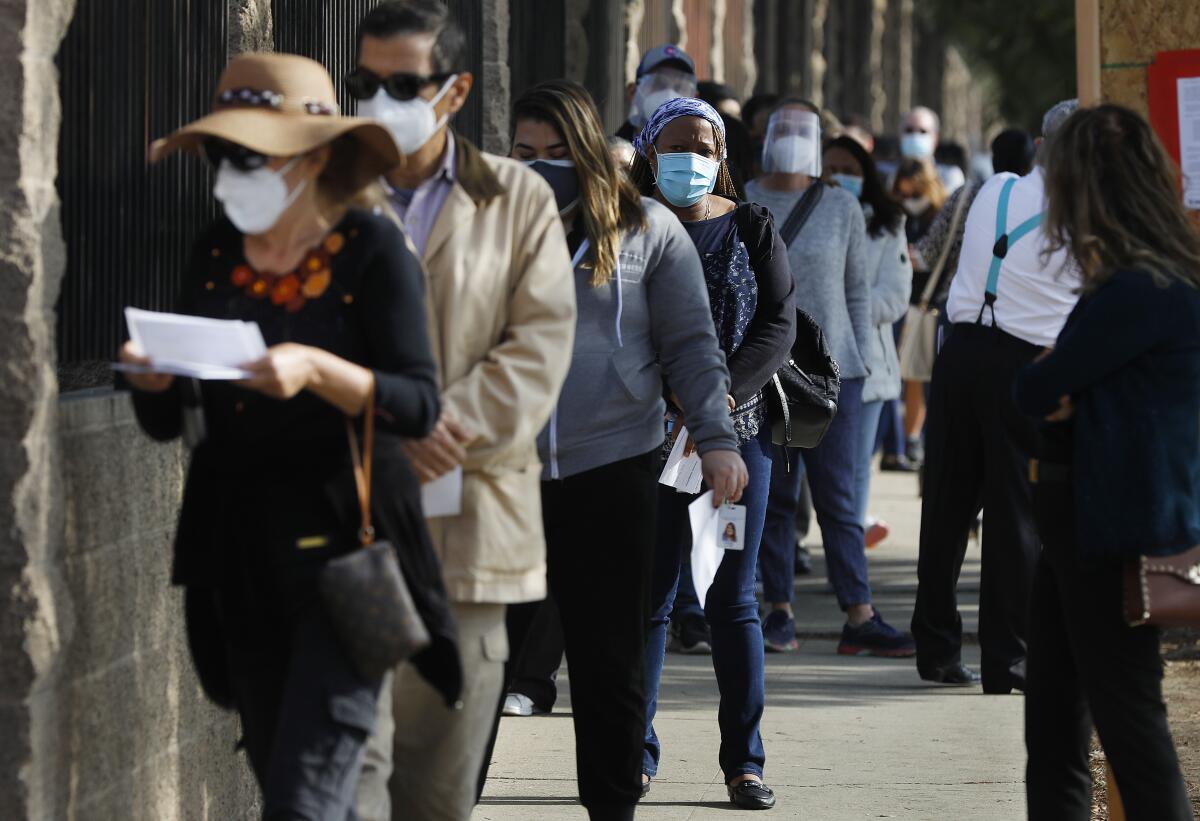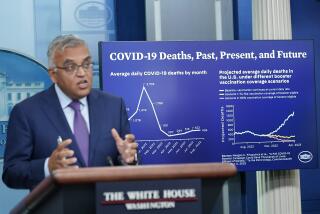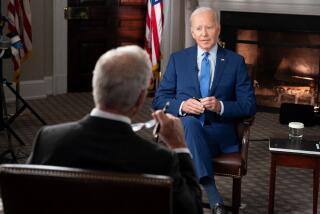Column: Come on, President Biden. Set some loftier COVID vaccination goals

We are far from the destination, but the return to normalcy has begun — and so have the normal games presidents play.
Many times President Trump said COVID would just “disappear,” as if it was so much fake news ginned up to help Democrats. At one campaign stop, he railed, “COVID, COVID, COVID, COVID. … On Nov. 4, you won’t hear about it anymore.”
Of course, he was wrong about the disease simply vanishing. More than 420,000 Americans have died of COVID-19 — far surpassing the number of U.S. soldiers who died in combat in both world wars and the Vietnam War combined. (That stark figure is 392,393.) And just because the spin from the newly installed Biden White House isn’t as remotely egregious or reality-defying as what many of us became accustomed to over the last four years, doing “better than Trump” isn’t a standard worth bragging about.
Every new administration likes to reset political expectations. Staff members arrive at their new offices, look at the books and declare, “Dear Lord! It’s so much worse than we ever imagined.” Normally, the calamity being discovered is economic. But this time it’s the pandemic.
“Biden inheriting nonexistent coronavirus vaccine distribution plan and must start ‘from scratch,’ sources say,” read the headline on a CNN article typical of the coverage. “There is nothing for us to rework. We are going to have to build everything from scratch,” one unnamed source was quoted as saying. Separately, Jeff Zients, the newly installed White House coronavirus czar, told reporters, “What we’re inheriting is so much worse than we could have imagined.”
To his credit, Anthony Fauci, President Biden’s chief medical advisor, pushed back on the “from scratch” stuff, albeit with mild understatement. “We’re certainly not starting from scratch, because there is activity going on in the distribution,” he said last week during a White House briefing.
On Trump’s final day in office, as my American Enterprise Institute colleague Yuval Levin notes, some 1.5 million people were vaccinated. That was a high point. During Trump’s final week in office, the seven-day average was 912,000 per day.
Keep those numbers in mind when the Biden administration postures as bravely committed to the uphill battle to deliver on the new president’s vow to complete 100 million vaccinations in his first 100 days. That would be an improvement of a mere 88,000 vaccinations per day on the rate he inherited. If they succeed in vaccinating just two additional people in every ZIP Code in America, they’ll accomplish their goal with room to spare.
Meanwhile, President Biden said “there is nothing we can do to change the trajectory of the pandemic in the next several months.” Obviously, the pandemic will be a huge challenge well through the spring, and there’s something refreshing about a president willing to tell people what he thinks they need to hear, not just what they want to hear. But if 912,000 vaccinations per day amounts to a baseline of starting from scratch, the Biden administration should set its sights higher. Much, much higher.
It might be better for the administration politically to set expectations low so it can wildly exceed them — and I hope that’s the case — but how does that benefit the country? Besides, a year into the pandemic, the country could use a morale boost.
The president says he wants the federal government to respond to this crisis as if it were a war. Well, we haven’t fully mobilized the country for war since WWII, and if that’s the model, the Biden administration is falling far short of the mark.
FDR put Gen. Leslie Groves, the man who built the Pentagon in 16 months, in charge of the Manhattan Project. Historian Paul Johnson tells the story of Groves calling the Treasury Department and demanding thousands of tons of silver for electrical wiring. The response from a vexed official: “In the Treasury we do not speak of tons of silver. Our unit is the troy ounce.” Groves got his silver because fastidious bureaucratic pettifogging was no match for a nation mobilized.
That’s the attitude people want from government right now. But last week, Biden said the federal government’s implementation of a vaccination program was “too rigid.” Ron Klain, Biden’s chief of staff, was asked Sunday on “Meet the Press” about the possibility — floated by Democratic Govs. Gretchen Whitmer of Michigan and Andrew Cuomo of New York — of allowing states to cut out the middleman and purchase vaccines directly. “I don’t think that’s possible,” Klain replied, because the emergency-use authorization of the existing vaccines requires federal oversight. This seems like a great opportunity to do away with some of that rigidity Biden was lamenting.
Similarly, the United Kingdom has already approved the AstraZeneca vaccine for emergency use, and the European Union could approve it this week. Under normal circumstances, I’d say the U.S. should wait for our Food and Drug Administration to finish scrutinizing the AstraZenica vaccine before adding it to our COVID arsenal. But these aren’t normal times.
And we will never have a true return to normalcy until the pandemic is behind us.
More to Read
A cure for the common opinion
Get thought-provoking perspectives with our weekly newsletter.
You may occasionally receive promotional content from the Los Angeles Times.











